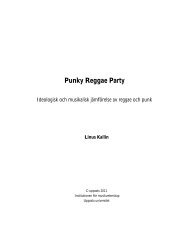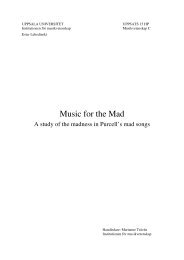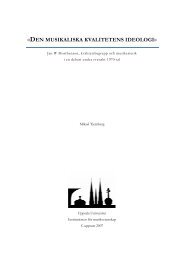What Does Donna Lee Mean? - Institutionen för musikvetenskap ...
What Does Donna Lee Mean? - Institutionen för musikvetenskap ...
What Does Donna Lee Mean? - Institutionen för musikvetenskap ...
You also want an ePaper? Increase the reach of your titles
YUMPU automatically turns print PDFs into web optimized ePapers that Google loves.
him. Jaco used to recommend all bassists “to learn tunes. Learn melodies. Most bass players<br />
make the mistake of just learning bass lines and nothing else. But you have to concentrate on<br />
learning a piece of music, thoroughly, which includes melody and harmony and theory as<br />
well [...]. All bass players should become more melody conscious” (Guitar Player: 1986).<br />
During the summer, Jaco practiced endless hours this way. His family and friends claim that<br />
it was hard for him to take his hand out of the bass.<br />
Just as any jazz musician with the tiniest bit of historic notion about their profession<br />
does, conciously or not, Jaco felt he needed to pay his dues to the “inventor” of modern jazz<br />
improvisation: Charlie Parker. As he aknowledges in an interview “(Charlie Parker) is<br />
definitely a big influence on me; he definitely can play some great lines. I really like the way<br />
Charlie Parker plays” (Rosen, 1978). Jaco can single-handedly be considered the leader of the<br />
modern way of playing the bass, which takes advantage of the innovations that horn players<br />
had been doing for years. As Jaco tells BBC interviewer Ray Recchi when talking about how<br />
he came across the innovations he’d be famous for, "I didn't know there was a barrier […].<br />
<strong>What</strong> I did, when I was a little kid, was I listened to records on a record player I won from a<br />
Rice Krispies contest. It was just a kid's record player so I couldn't hear the bass, only the<br />
melody. So I played what I could hear, if it was a sax or a piano or whatever”.<br />
As Jaco himself puts it when discussing his technique with Neil Tesser, "I felt that I<br />
had never heard anyone clearly outline a tune on the bass. Maybe someone has done it before,<br />
I don't know because I don't listen to that many records, but I had never heard it before. I had<br />
never heard someone take a tune like '<strong>Donna</strong> <strong>Lee</strong>,' and play it on the bass without a piano<br />
player so that you always could hear the changes as well as the melody. It's a question of<br />
learning to reflect the original chord in just the line. Players like Wayne Shorter, Sonny<br />
Rollins, Herbie Hancock, Ira Sullivan can do that. I wanted to be able to do it, too." Choosing<br />
to display this on his record with a dazzlingly fresh version was no accident. Bebop was his<br />
self-imposed theory class. "The first jazz record I heard was a Max Roach quarter date," he<br />
says "with Kenny Dorham and Hank Mobley. I don't even know who the bassist was. The<br />
record was old, and shot, and I couldn't hear the bass player at all. The only thing I could hear<br />
was these lines. So I just worked them all out on the bass, without thinking anything of it.<br />
And at 15, I already knew how to play most of Bird's 1 tunes, I couldn't play them very fast,<br />
because of my arm, but I studied them, and I knew how they worked. Just the heads. I didn't<br />
mess with the solos, man; I figured that was personal" (Tesser 1977).<br />
It is obvious that Jaco was aiming at having some kind of impact in the world, as if he<br />
thought of playing such a classic for dead-head / serious jazzers as <strong>Donna</strong> <strong>Lee</strong> would at once<br />
give him the credit everyone that knew him, and above all himself, thought he deserved. As<br />
1 Charlie Parker’s nickname.<br />
11










